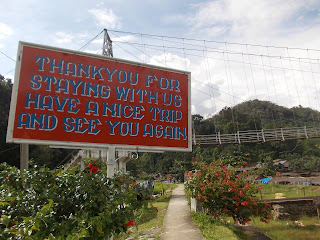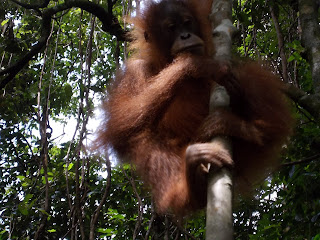We have a tonne of stories and pictures to share, so we will divide it up over several blog posts and string them out over the next week or so. Keep checking back for more updates!
Part One: Paul’s Primal Primate Encounter.
Paul spent a full 24 hours travelling from Dalian to Sumatra. First a short puddle hop from Dalian to Tianjin, then a flight from Tianjin to Kuala Lumpur, a night spent trying to sleep on the hard, brightly lit budget carrier’s airport in KL and a final flight to Medan in Indonesia.
Medan is a bit of a cesspool. It sprawls, low and dirty, for many tens of kilometres. It’s hot and humid and the traffic is worse than anywhere else we have travelled so far. Other than that it is a delightful city. Paul found an old man who spoke a little English and who offered to take him to the bus station for a price significantly lower then what the taxis wanted to charge. They weaved their way through slums and shops, dodging brightly painted vans stuffed with people and crazy Grandmas on scooters to get to the staging point for all the local buses.
 |
| The best part of Medan were these sweet flower billboards advertising everything from engagemens to markets to Coca-cola. Awesome. |
The bus took some six hours to get from Medan to Bukit Lawang. It probably should have been four, but the driver stopped often to have a drink and a chat with a friend, or cruise slowly down a street while trying to drum up some more customers. The ride was hot and bouncy, and the bus cruised through some beautiful and some very depressing scenery.
Most of Northern Sumatra used to be covered in some of the worlds thickest, most impenetrable rainforest. Only recently has that begun to change, but the rapid pace of the change is staggering. We drove through mile after mile of recently burned forest. Acres and acres of land cut, burned and replanted with oil palm. Thousands of acres. Oil palm is a monoculture that brings in a lot of money for communities that hover on and around the brink of poverty. It is one of the few crops that can grow in the depleted soil left when you cut down a rainforest and it provides a chance for communities to develop an economy based on something other than subsistence farming. However, the destruction of the biodiverse rainforests and the speed at which they are disappearing was really hard to look at.
After several hours of travelling through oil palm plantations, pockets of rainforest began to appear on the hilltops. Soon the entire road was being encroached upon by the massive hardwoods with their entourage of vines and ferns. Paul disembarked at Bukit Lawang station (basically the side of the road in the middle of a farmer’s field). He then followed a little local boy up a side track (rather then pay the tuk tuk drivers to take him into “town” along the road). After a few minutes of walking along, munching amiably on rose apples and “water fruit” with the local boy, Paul found himself crossing the river on a rather crude and derelict suspension bridge. He haggled with an inn owner on the far side, and because it was the low season, he managed to negotiate a clean (though bare and basic) room for just under 5 dollars. With breakfast included.
 |
| Bukit Lawang- a friendly place. |
Bukit Lawang is an interesting place. It relies almost entirely on tourist dollars from people who come to see the apes. It was almost destroyed in 2003 by a flash flood that tore down the river and took a fair number of homes and people with it. Hot, dusty, rainy, the little town spreads up and down the banks of the river for about three kilometres before petering out into the jungle.
Paul booked himself onto a two day trek almost immediately after arriving. There were other tourists along for the trek, most of whom were not nearly as prepared to hike in the Sumatran jungle. Paul showed up in hiking boots with his belongings nicely sealed in waterproof stuff sacks and extra pairs of socks, a t-shirt and three litres of water ready for his arrival at camp. Two of the other trekkers were wearing cotton loafers. One girl didn’t have anything with her but the clothes on her back.
The guides were great. Tiny (less than five feet), surefooted local men who were licensed by the village coop to take people like my companions into the jungle and make sure they came out smiling and safe, these men were extremely competent. They would disappear for a few minutes into the bush beside a trail, then reappear 100 meters down the path silently. Almost always they would lead us to a perfect spot to see this Thomas Leaf Monkey, or that White Handed Gibbon, or a particularly loud Hornbill.
 |
| Rocking the leaf hat during a rainstorm... so 2011. |
We saw our first orang-utan four hours into the trek. Three apes- mom and two daughters- were slowly meandering their way through the upper canopy. The mom and baby stayed there, but the older daughter was curious and made her way down the vines and trunks of trees to see what these hairless apes staring up at her were all about. It was a pretty magical experience to have her so close, and so interested in us. She bounced around in the trees right above us for almost fifteen minutes before returning to her mom.
 |
| This is about the moment Paul started hyperventilating with excitement. |
 |
| Surreal? Yes. |
We saw several other orang-utan, all female, in the next few hours. We also got to see long tailed macaques, Thomas leaf monkeys, white handed Gibbon (another ape species), monitor lizards, and a variety of other extremely cool flora and fauna.
 |
| That punky monkey is a Thomas Leaf monkey. He is rocking an elegant hair style and a long (but not prehensile) tail. |
About an hour after lunch the rain started to come down hard. It was impossible to stay dry, and pretty soon we were soaked through to the skin. We waded through muddy paths, over streams and up and down hills until we made it down into a little valley. There across the river was the camp. We loaded ourselves into inner tubes and the guides pushed us across the rather swollen river. We stripped down to our skivvies and washed the mud sweat and leeches (yes leeches) off of ourselves by the side of the river.
Camp was an open bivouac. Poles had been pounded into the ground, and a tarps carefully fastened over top. It was dry under the tarp, but one side of the tent was completely open to the jungle and provided no shelter from mosquitoes, leeches or monitor lizards. In the middle of the night this fact was driven home by the fact that Paul woke up with something warm burrowing into his armpit. He freaked out a bit when it suddenly jumped onto his face and then scampered off because of his thrashing and screaming. Naturally this woke the rest of the trekkers, who, not knowing what was going on, also freaked out. The bush rat/monkey/monster bumped into several other people on its way out, which amplified their screaming and made Paul feel a little better. He had one small scratch down his cheek which he washed and covered in antibiotic cream, but other than that escaped pretty much unscathed! However he didn’t get a lot more sleep after that.
 |
| The "tent" where we spent the night. Notice the lack of a final side. |
The next day the trekkers hung around the camp area, hiking to a nearby waterfall, before we rafted our way down the swollen river and back to Bukit Lawang. The experience was pretty special, and left Paul wishing he had more time and money to spend towards a longer Sumatran jungle excursion. Definitely something to save his pennies for!
 |
| Rafts made of inner tubes lashed together with twine. Scary but effective. |


No comments:
Post a Comment